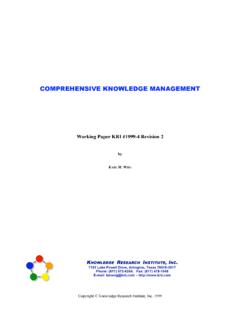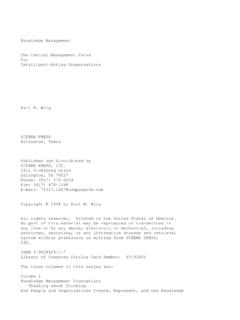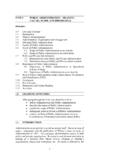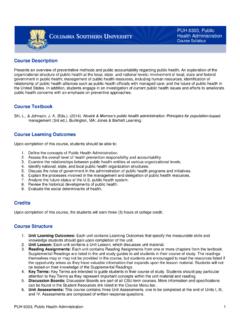Transcription of Application of Knowledge Management in Public …
1 Application of Knowledge Managementin Public AdministrationKarl M. WiigKnowledge Research Institute, , Texas, USA PreparedforPublic Administrators of the City of Taipei, Taiwan, ROCMay, 2000 ContentsPageAbstract 1 Introduction 1 Comprehensive Knowledge Management 2 Public Administrators Role in Societal Knowledge Management 6 Assure Competent and
2 Effective Public Services 8 Prepare Effective Policy Partners 10 Build and Leverage Public and Private Intellectual Capital 11 Develop Capable Knowledge Workers 12 Knowledge Management Activities and Benefits 12 Concluding Comments 13 Appendix 19 References 24 Application of Knowledge Management in Public AdministrationKnowledge Management (KM)
3 Plays important roles in Public administration (PA). Each role serves specific constituencies and purposes and is implementeddifferently. Jointly, they build society s intellectual capital (IC) to improve theeffectiveness of Public and private decision making and situation handling. FourPublic administration KM areas are considered: Enhance decision making withinpublic services; Aid the Public to participate effectively in Public decisionmaking; Build competitive societal IC capabilities; and Develop Knowledge -competitive work force. Numerous KM approaches are adopted to serve thesepurposes. Most efforts address specific needs. Only few pursue broad, deliberate,and systematic KM.
4 Examples of these approaches and perspectives arediscussed. The premise for KM is that among many factors, effective andintelligent behavior depends on having appropriate understanding in addition tobeing and success of any society is largely a function of how its resources can be include natural resources, geographic location, capability of people, and resources likeintellectual capital (IC).1 Public administration (PA) in any society is important and complex. Itaffects most aspects of society. Its approach and effectiveness determine the society s culture,quality of life, success, and viability. It also acts as pace setter, planner, implementer, educator,peacemaker, and disciplinarian, all with different emphases depending on the society s cultureand agendas.
5 A competent PA with sufficient capacity and influence can provide for a greatsociety. An incompetent or dysfunctional one can lead the society into severe decline, even be successful in fulfilling its functions in a democracy, the citizenry must cooperate in manyways and have confidence in the society s capabilities, directions, and actions. Successful citizenparticipation and confidence depend largely on broad understanding of, and agreement withactions by Public entities and acceptance of implications of those actions. An ignorant citizenryis a poor Public policy partner. A vital aspect of the society s success is the Knowledge that itscitizens possesses, is made available to its Public servants, and is embedded in structural andother intellectual capital assets that can be leveraged internally and in the global shares responsibility to assure that its society provides the quality of life intended for itscitizens.
6 From a societal Knowledge or IC perspective, this implies participation in building andleveraging society s IC to obtain the necessary economic foundation. It also implies long-termresponsibilities to foster development of a competitive work force that can compete in regionaland global economies. These issues are well known to Public administrators (PAs). However, thepast has not offered opportunities to address them with powerful and systematic approaches. Thisis changing. The broad field of Knowledge Management (KM) introduces new options, 1 Intellectual capital (IC) is used to denote all aspects of personal tacit and explicit Knowledge as well as structuralintellectual capital, be it explicit, embedded in technology, or in other : Application of Knowledge Management in Public administration - 2 -capabilities, and practices to assist PA to great advantage.
7 It becomes a new responsibility tomanage Knowledge to strengthen Public service effectiveness and improve the society it goals are to improve the effectiveness and sustained viability of any enterprise be it acommercial corporation, a part of society, a country, or a single individual. KM must be fullyaligned to the enterprise s central objectives. The KM objectives for PA in a democracy may beexpressed as the intent to provide: Effective PA services and functions to implement the Public agenda. Public services mustaddress issues and requirements relevantly, competently, and timely and consume minimalresources. They should also deal appropriately and expeditiously with unexpected challengesand disasters.
8 A stable, just, orderly, and secure society. This includes preparing citizens, organizations,and Public agencies to be effective policy partners to create sound Public opinions toengage in Public debates and policy formation to participate in processes to conceptualize,plan, decide, and implement Public actions to observe society policies and to providesupport for the administration . Acceptable level of quality of life, particularly through building, maintaining, and leveragingcommercial and Public intellectual capital. A prosperous society by developing its citizens to become competent Knowledge workers andits institutions to be Knowledge ManagementRecently, the roles of Knowledge and understanding for organizational performance have becomeclearer.
9 Early on, managerial emphasis was placed on observable work. Later it included the roleof information. Now, focus is shifting to include Knowledge . It has always been understood thatknow-how and expertise influence quality of work. However, the Knowledge focus has tended tobe on the individual and not on systematic considerations of broader work processes orknowledge mechanisms within There has been little focus on invisible work,particularly on how workers think and utilize Knowledge when performing changes in business emphasis are driven by many factors. They include an increasinglysophisticated and demanding market place, deeper insights into business functions, and greaterunderstanding of Knowledge intensive work and how people think, learn, and use Knowledge , cognitive sciences (Brown and Duguid, 2000; Damasio, 1994 and 1999; Halpern, 1989;Nonaka and Takeuchi, 1995; Klein, 1998; Sch n, 1983; Wiig, 1993).
10 Gradually, leaders start tofocus on managing Knowledge deliberately and systematically. KM has emerged to create andleverage IC into the business equation and into Public Management (Allee, 1998; B hme andStehr, 1986; OECD, 2000; Reich, 1991; Wiig, 1994 and 1997). IT is used extensively to supportKM although many information Management tools are marketed as being KnowledgeManagement tools, which they arguably are not. Knowledge , it must be realized, is distinctlydifferent from information and that KM and information Management are not the same. 2 Systematic approaches, when applied to societal processes, emphasize applying systems theory to deal withinterconnectedness, effects over time, parallelisms, and nonlinear : Application of Knowledge Management in Public administration - 3 -Figure 1 provides a perspective a dynamic model of the role that IC assets play in enterpriseperformance.










